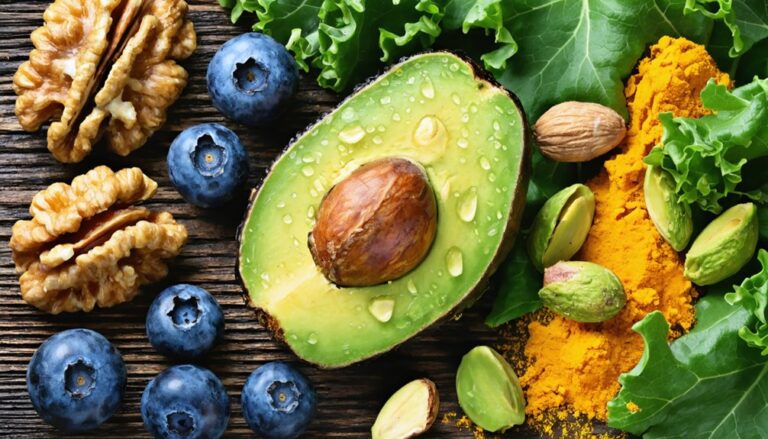A diet rich in leafy greens, berries, nuts, seeds, and omega-3 fatty acids from fish substantially improves brain health and cognitive function. Leafy greens improve memory and reduce cognitive decline, while berries combat oxidative stress. Nuts and seeds offer essential nutrients that increase memory. Healthy fats, particularly from fish, support brain structure and reduce inflammation. Additionally, following the MIND diet can provide further cognitive benefits. There are many more strategies to promote ideal brain health.
Highlights
- Consume leafy greens regularly to enhance cognitive function and reduce the risk of cognitive decline, especially in older adults.
- Incorporate berries into your diet, as they are rich in neuroprotective compounds that improve memory and protect against age-related memory loss.
- Add nuts and seeds, particularly walnuts, for their omega-3 fatty acids, which support cognitive health and may delay cognitive decline.
- Include fatty fish in your meals to benefit from omega-3s, like DHA, that promote brain health and maintain brain structure.
- Follow the MIND diet, emphasizing green leafy vegetables and berries, to significantly reduce the risk of Alzheimer’s disease and enhance cognitive resilience.
Benefits of Leafy Greens for Cognitive Function
The consumption of leafy greens has emerged as a key player in enhancing cognitive function and mitigating cognitive decline, particularly in older adults. Research highlights the leafy benefits of vegetables like kale, spinach, and collard greens, showing that individuals who incorporate these greens into their diet experience cognitive function equivalent to being 11 years younger than non-consumers. The green advantages are further emphasized by findings that those consuming seven or more servings weekly exhibit substantially less beta-amyloid accumulation, a marker associated with Alzheimer’s disease. Nutrients such as vitamin K, lutein, and folate found in these vegetables contribute to better memory performance and reduced inflammation. Moreover, studies have indicated a positive association between green leafy vegetables and slower cognitive decline. Consequently, making leafy greens a staple can promote a thriving sense of community among those seeking improved brain health. Moreover, eating one serving of green leafy vegetables a day may help promote brain health and should not be overlooked.
Power of Berries and Fruits in Brain Health
Berries and fruits stand out as powerful allies in the quest for better brain health, offering a wealth of neuroprotective compounds that support cognitive function. The berry benefits are attributed to their high levels of flavonoids, particularly anthocyanins, which combat oxidative stress and inflammation. Research indicates that consistent berry consumption can enhance memory and cognitive performance, as seen in studies involving older adults and middle-aged individuals. Unique phytochemicals in various berries act synergistically, improving neuronal communication and promoting neuroplasticity. Additionally, these fruits stimulate brain-derived neurotrophic factor (BDNF) expression, crucial for long-term cognitive health. Furthermore, polyphenols in berry fruits can cross the blood-brain barrier and scavenge reactive oxygen species, providing additional neuroprotective effects. Recent studies suggest that eating berries can significantly help prevent age-related memory loss, highlighting their importance in maintaining cognitive function as we age. Moreover, the cognitive benefits of strawberries, linked to decreased memory interference, emphasize their potential to support mental clarity and memory processing in older adults.
Importance of Omega-3 Fatty Acids From Fish
In addition to the benefits offered by berries and fruits, omega-3 fatty acids derived from fish play a significant role in enhancing cognitive function and promoting brain health. Research indicates that fish oil supplementation markedly improves memory scores, particularly in individuals with low baseline DHA levels. Moreover, regular consumption of fish is associated with better-preserved brain structure and reduced atrophy in Alzheimer’s-vulnerable regions. Omega-3s help decrease beta-amyloid plaques and lower inflammation, fundamental contributors to Alzheimer’s. For those seeking to optimize brain health, incorporating fish or considering brain supplements high in DHA and EPA can be a game-changing step. Embracing these nutrients supports resilience against cognitive decline and nurtures overall mental well-being, and also promotes a metabolic shift to alter brain function. Additionally, DHA accounts for more than 40% of total omega-3 PUFAs in neuronal tissue, which emphasizes its essential role in brain health. Participants with a higher omega-3 index had larger hippocampal volumes, further supporting the link between omega-3s and improved brain structure. Furthermore, regular fish consumption is linked to reduced risk of Alzheimer’s disease, highlighting the importance of including these healthy fats in your diet for long-term cognitive protection.
Role of Nuts and Seeds in Enhancing Memory
Nuts and seeds emerge as key players in the quest for enhanced memory and cognitive function. Clinical studies highlight significant nut benefits, revealing improvements in memory performance for individuals consuming mixed nuts regularly.
Specifically, walnuts are linked to cognitive advantages due to their omega-3 fatty acids and polyphenolic compounds, which augment brain activity and support memory functions. A Mediterranean diet augmented with nuts has shown positive correlations with improved cognitive scores over time, particularly among older adults facing cardiovascular risks. Additionally, the intake of nuts is associated with reduced cardiovascular risk, further underscoring their importance for brain health. Increased nut consumption not only benefits cognitive health but may also delay age-related cognitive decline among older adults. Moreover, a diet rich in a combination of nutrient-rich foods is essential for promoting overall brain health and function.
Additionally, seeds offer their advantages, containing essential nutrients that synergistically contribute to brain health. Collectively, these findings suggest that including nuts and seeds in one’s diet can promote memory enhancement and cognitive resilience, creating a sense of belonging in the pursuit of mental wellness.
Healthy Fats and Their Impact on Brain Function
Healthy fats play a crucial role in maintaining ideal brain function and cognitive health. The fatty acids discussion emphasizes the importance of n-3 PUFAs, such as DHA and EPA, which substantially enhance neurobiological processes related to cognition. Brain function analysis reveals that monounsaturated fats, primarily from plant sources and fish, are linked to improved cognitive outcomes. These fats not only support neuronal membrane fluidity and maintain brain cell structure but also modulate neuroinflammatory pathways essential for peak performance. Antioxidants found in olive oil, a staple in heart-healthy diets, further protect brain health by mitigating oxidative stress. By prioritizing healthy fats, individuals nurture resilience against cognitive decline and promote long-lasting brain vitality within their daily diets. Additionally, the ideal ratio of omega-6 to omega-3 polyunsaturated fatty acids in the diet is considered crucial, emphasizing the need for balance in dietary fat intake. Recent research suggests that very long-chain saturated fatty acids can also provide cognitive benefits and may help lower the risk of cognitive decline over time. Furthermore, certain types of fats, such as polyunsaturated fatty acids, have been shown to play a significant role in enhancing brain health outcomes overall.
The MIND Diet and Its Advantages for Brain Aging
The MIND diet, a fusion of the Mediterranean and DASH diets, emerges as a powerful tool in the quest to combat brain aging and enhance cognitive resilience. Emphasizing the consumption of nutrient-rich foods like berries and leafy greens, this diet promotes ten brain-healthy food groups, contributing to significant brain benefits. Research reveals that individuals with higher adherence to the MIND diet experience cognitive decline rates similar to being 7.5 years younger than those with lower adherence levels. Additionally, consistent following of this diet may reduce Alzheimer’s disease risk by up to 53%. The MIND diet’s components include green leafy vegetables and berries, which provide important nutrients for brain health. The MIND diet is associated with a lower risk of cognitive decline, offering further incentive for individuals to adopt these eating habits. Studies indicate that long-term commitment to the MIND diet is crucial for maximizing its cognitive benefits. With varying effectiveness across demographics, the MIND diet stands as a crucial strategy for those seeking to improve their cognitive health through mindful eating practices, playing an essential role.
Additional Nutrients That Support Brain Health
A well-rounded approach to brain health includes a variety of essential nutrients beyond just the foundational dietary patterns like the MIND diet. Nutrients such as choline play a critical role in supporting cognitive function and may delay brain aging, as researchers discovered choline is actively transported into the brain by a protein. Omega-3 fatty acids—predominantly DHA—constitute a large part of the brain and are crucial for reducing inflammation and preserving neuronal health. Additionally, the protective effects of antioxidants like Vitamin E can enhance memory performance, while B vitamins aid in homocysteine metabolism, reducing dementia risks. Furthermore, adequate magnesium levels have been associated with improved cognitive performance. Emerging research also highlights probiotics benefits, suggesting that gut health may influence brain health, creating a comprehensive approach to cognitive well-being. Including a diet rich in omega-3 fatty acids is essential for supporting brain evolution and cognitive health.
Practical Tips for Incorporating Brain-Healthy Foods
Incorporating brain-healthy foods into daily routines can be both enjoyable and manageable with strategic planning and creativity.
Successful meal planning can include preparing whole grain toast with avocado for breakfast and grilled salmon with leafy greens for lunch.
By creating a weekly rotation of berries and including walnuts in snacks, individuals can enhance their antioxidant intake.
Gradually replacing processed snacks with nutrient-dense options can build sustainable habits.
Utilizing food journaling helps track dietary changes and uncover preferred combinations.
Simple substitutions, such as avocados for butter or quinoa for refined grains, further enhance meals.
Foods to Avoid for Optimal Brain Performance
While many foods can enhance cognitive function, certain items must be avoided to maintain ideal brain performance.
High-fat and saturated fat foods have been linked to brain inflammation, posing risks for neurodegenerative diseases like Alzheimer’s.
Sugary foods, particularly beverages, may cause blood sugar spikes that impair memory and mental clarity.
Processed and ultra-processed foods show strong correlations with cognitive decline and depression, exacerbated by toxic ingredients like trans fats and artificial sweeteners.
Combining refined sugars with unhealthy fats accelerates cognitive deterioration, creating a double impact on brain health.
To promote perfect brain performance, it is essential to steer clear of these harmful food choices that can hinder cognitive function and overall wellbeing.
References
- https://www.health.harvard.edu/healthbeat/foods-linked-to-better-brainpower
- https://pmc.ncbi.nlm.nih.gov/articles/PMC2805706/
- https://www.heart.org/en/news/2024/09/27/food-for-thought-how-diet-affects-the-brain-over-a-lifetime
- https://www.mayoclinichealthsystem.org/hometown-health/speaking-of-health/maximize-memory-function-with-a-nutrient-rich-diet
- https://www.brightfocus.org/resource/eating-for-brain-health/
- https://www.health.harvard.edu/blog/nutritional-psychiatry-your-brain-on-food-201511168626
- https://pmc.ncbi.nlm.nih.gov/articles/PMC10083484/
- https://www.cuimc.columbia.edu/news/your-brain-food-what-we-know
- https://www.nm.org/healthbeat/healthy-tips/nutrition/best-food-for-a-healthy-brain
- https://www.health.harvard.edu/mind-and-mood/managing-stress-and-eating-leafy-vegetables-may-protect-the-brain



